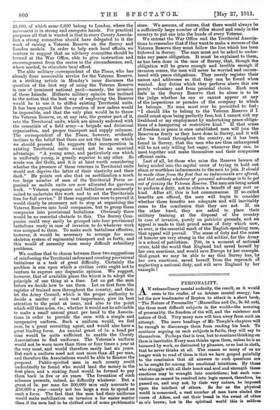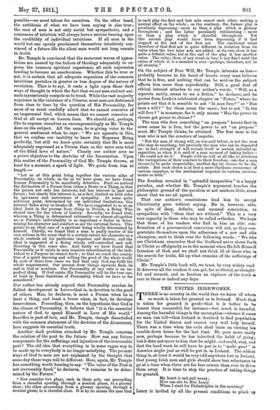PERSONALITY.
AN extraordinary mental audacity, the result, as it would seem to the reader, of an intense mental energy, has led the new headmaster of Repton to attack in a short book, " The Nature of Personality " (Macmillan and Co., 2s. 6d. net), the three most difficult subjects in the world—the meaning of personality, the freedom of the will, and the existence and nature of God. Very many men will turn away from such an attempt. The mere headings of Mr. Temple's chapters will be enough to discourage them from reading his book. To continue arguing on such subjects is futile, they will say to themselves. Perhaps that is true, but to continue thinking on them is inevitable. Every man thinks upon them, unless he is so harassed by work, so distracted by pleasure, or so lost in sloth, that he never thinks at all. The reason so many of us no longer wish to read of them is that we have groped painfully to the conclusion that all answers to such questions are to be sought for among the emotional intuitions. By those who struggle with all their heart and soul and strength these emotions may be wrought into convictions; but such con- victions as cannot be resolved into logic cannot, therefore, be passed on, and may not, by their very nature, be imposed upon the intellect of others. So far as the physical world is concerned, a. vast number of men have eluded the curse of Adam, and eat their bread in the sweat of other m's brows; but in the spiritual world this is seldom possible—we must labour for ourselves. On the other hand, the antithesis of what we have been saying is also true ; the race of men is not only social but sympathetic, and a consensus of intuition will always have a serious bearing upon the credibility of individual intuitions. If all men in the world but one openly proclaimed themselves intuitively con- vinced of a future life the silent man would not long remain in doubt.
Mr. Temple is convinced that the recurrent waves of agnos- ticism are caused by the failure of theology adequately to ex- press the common spiritual experience, all such expression tending to become an anachronism. Whether this be true or not, it is certain that all adequate exposition of the common intuitions partakes in greater or less degree of the nature of revelation. That is to say, it casts a light upon those dark ways of thought in which the fact that we are men and not ani- mals mysteriously compels us to tread. While the vast majority acquiesce in the existence of a Creator, most men are distressed from time to time by the question of His Personality, for most of us must candidly admit that we cannot conceive of an impersonal God, which means that we cannot conceive of God at all except on human lines. We should not, perhaps, like to express ourselves as uncompromisingly as Mr. Temple does on the subject. All the same, he is giving voice to the general sentiment when he says " We are agnostic in this, that we confess our inability to know the Supreme Being perfectly, but still we know quite certainly that He is more adequately expressed as a Person than as the mere sum total of the blind laws of nature." Clearly our author sees no a priori objection to the doctrine of the Incarnation. Upon this matter of the Personality of God. Mr. Temple throws, at least for a moment, a spark of light. We quote from him at length :—
"Let us at this point bring together the various sides of Personality, on which, as far as we have gone, we have found human Personality to be manifestly defective. First we noticed the distinction of a Person from either a Brute or a Thing, in that the person not only has interests, but has interest in past and future; but clearly this interest is, as a fact, limited on both sides by ignorance and narrowness of sympathy. At some quite arbitrary point, determined by our individual limitations, this interest fades away or breaks off. We have suggested to us as an ideal limit in the process from thing to Person, a Being Who should care for the whole of history. Secondly, we found that, -whereas a Thing is determined externally—or almost altogether so—a Person's individuality is as important a factor in deter- mining his character and conduct as are the external forces. This points to an ideal case of a spiritual being wholly determined by himself. Thirdly, we found that a man is partly master of his own actions in the sense that to a certain extent his character as a whole controls all his particular impulses and desires; and the ideal is suggested of a Being wholly self-controlled and self- directing in this sense also. And lastly we have found that Personality as it exists in men requires subordination of the indi- vidual to a Purpose he cannot know; so that we reach the concep- tion of a spirit knowing and willing the good of the whole world. In each of these four cases we find that only God can fulfil the whole requirement. Our process from things upwards finds its end in God or nowhere. Our Personality at any rate is an im- perfect thing. If God exists, His Personality will be the true one, at least in those functions of Personality which we have so far considered."
Our author has already argued that Personality reaches its fullest development in Love—that is, in devotion to the good of others. Man, he declares, is most a Person when he is least a thing, and least a brute when, in fact, he develops benevolence. Proceeding, then, on the hypothesis that God is the climax of Personality, it follows that "it is the essential nature of God to spend Himself in Love of His world." Sacrifice is part of love, and Mr. Temple, though dissatisfied with the common statement of the doctrine of the Atonement, here suggests its essential truth.
Another dark problem attacked by Mr. Temple concerns the relation of the past to the future. How can any future compensate for the sufferings and injustices of the irrevocable past ? The old idea that everything is in some vague way to be made up to everybody is no longer satisfying. The present Ways of God to men are not explained by the thought that some day those ways will be different. Here, again, Mr. Temple has something worth hearing to say.'" The value of the Past is not irrevocably fixed," he declares, " it remains to be deter- mined by the Future."
" Now consider two plays, each in three acts, one proceeding from a cheerful opening, through a neutral phase, to a gloomy close; the other proceeding from a gloomy opening, through a neutral phase, to a cheerful close. It is by no means the case that •
in each play the first and last acts cancel each other, making a neutral effect on the whole ; on the contrary, the former play is peculiarly depressing—more so than a play which is gloomy throughout ; and the latter peculiarly exhilarating — more so than a play which is cheerful throughout. Yet this second play would have been depressing if it had stopped at the end of the first act. The emotional value therefore of that first act is quite different in isolation from its value when the two later acts are added : at its own close it has quite a definite value, but at the end of the play it has another value. The value, then, of any event in time is not fixel until the series of which it is a member is over—perhaps, therefore, not to all eternity."
On the subject of Free Will, Mr. Temple interests us less— probably because in his heart of hearts every man believes that he is free, and nothing that can be said on the subject affects him more than superficially. Still, a. good deal of ethical interest attaches to our author's words : " Will, as a separate entity, seems to me a fiction," he declares, and he quotes from Locke's celebrated chapter on "Power," where he points out that it is sensible to ask "Is man free? " or "Has man a will ? " for these mean the same; but to ask "Is the will free ? " is nonsense, for it only means "Has the power to choose got power to choose I' " The man who does something " on purpose " knows tha t in some sense he is free, but the power to act " on purpose " must, Mr. Temple thinks, be attained. The free man is the man who is not the creature of impulse.
" But the man of strong will, as was said before, is not the man who may do anything, but precisely the man who can be depended on : in fact, strength of will reveals itself in certain splendid in- capacities, as when it is said of a man accused of taking bribes- ' He could not do it.' People with no will at all like to attribute the variegations of their conduct to their freedom ; one day a man chooses to be quite respectable ; another day he chooses to be dis- solute. But such choice is at best a mere rhythmic recurrence of various impulses, or the mechanical response to various environ- ments or both."
The freedom revealed in "splendid incapacities " is a happy paradox, and whether Mr. Temple's argument touches the philosophic ground of the question or not matters little, since about that we are all agreed.
That our author's conclusions lead him to accept Christianity goes without saying. He is, however, able, in spite of deep, definite, and assured conviction, to sympathize with "them that are without." This is a very rare capacity in those who may be called orthodox. We hope that those of his readers who find in him an able con- firmation of a preconceived conviction will not, as they con. gratulate themselves upon the adherence of a new and able champion, omit to think over the following words : " We who
are Christians remember that the Godhead never shone forth in Christ so effulgently as in the moment when He felt Himself forsaken of God, and we shall not think al of those who, in
the search for truth, fill up what remains of the sufferings of Christ."
Mr. Temple's little book will, we trust, be very widely read It deserves all the readers it can get, for so liberal, so thought- ful and earnest, and so fearless an explorer of the truth is rare in these or indeed any days.











































 Previous page
Previous page